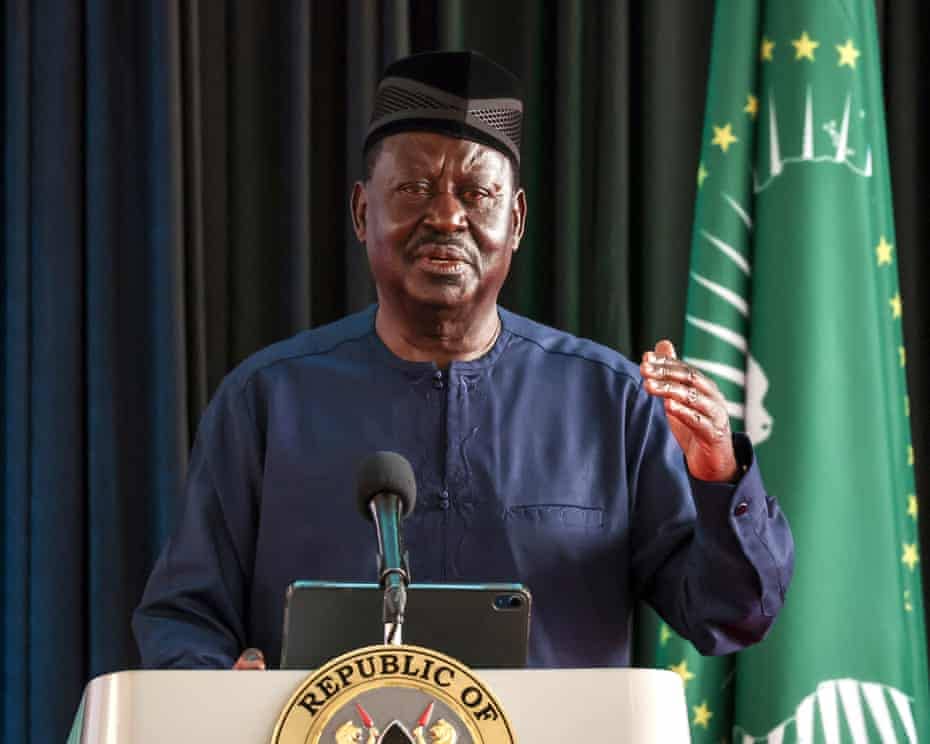

October 20, 2025 -Nairobi, Kenya – Raila Amolo Odinga, Kenya’s veteran opposition leader and former Prime Minister, remains one of Africa’s most enduring symbols of democratic struggle. For more than four decades, Odinga embodied the hopes, frustrations, and resilience of a nation constantly negotiating between progress and political division. His journey from prisoner of conscience to continental statesman mirrors the turbulence and transformation of modern Kenya.
A Life Rooted in Resistance
Born in Maseno, Kisumu County, in 1945, Odinga inherited a political legacy from his father, Jaramogi Oginga Odinga, Kenya’s first Vice President. Educated in East Germany, Raila returned home as a mechanical engineer, but his calling quickly turned to politics.
During the autocratic rule of President Daniel arap Moi, Odinga became a voice of dissent, calling for democracy and pluralism. In 1982, he was detained without trial for years over allegations of involvement in a failed coup attempt a charge he always denied. Those years of confinement transformed him into a symbol of defiance and reform.
Champion of Multiparty Democracy
Odinga’s activism was instrumental in Kenya’s transition to multi-party democracy in the early 1990s. Elected to Parliament in 1992, he became a central opposition figure, pushing for constitutional reform, transparency, and equitable governance. His rise was marked by his ability to mobilize mass movements and articulate the frustrations of ordinary Kenyans.
In 1997, he ran for president for the first time, laying the foundation for a political career defined by perseverance and near-victories.
The 2007 Crisis and Coalition Government
The 2007 general election marked the most dramatic and tragic chapter of Odinga’s career. Running under the Orange Democratic Movement (ODM), he appeared set to defeat incumbent President Mwai Kibaki. However, when the electoral commission declared Kibaki the winner amid allegations of fraud, violence erupted across the country.
Over 1,100 people were killed and hundreds of thousands displaced in post-election clashes that shocked the world.
Mediated by former UN Secretary-General Kofi Annan, the two rivals agreed to a power-sharing government. Odinga became Prime Minister in 2008, serving until 2013. Despite tensions within the coalition, this period produced Kenya’s 2010 Constitution a landmark document that decentralized power, strengthened the judiciary, and introduced a more inclusive system of governance. Many consider this Odinga’s greatest legacy.
The Unfinished Presidential Quest
Odinga’s repeated presidential bids in 2013, 2017, and 2022—cemented his reputation as Kenya’s eternal reformist. In each race, he rallied millions with promises of justice and equality, only to face narrow and disputed defeats.
In 2017, he boycotted a repeat election after the Supreme Court annulled the initial vote over irregularities. In 2022, backed by outgoing President Uhuru Kenyatta, he lost again—this time to William Ruto in an election observers deemed credible but bitterly contested.
Through it all, Odinga’s unwavering commitment to the ballot box, not the bullet, reinforced his image as a democrat above all else.
Continental Influence and Final Years
Beyond Kenya, Odinga served as the African Union High Representative for Infrastructure Development, advocating regional integration and cross-border connectivity. His diplomatic role elevated him to a continental platform, symbolizing the bridge between Africa’s liberation generation and its modern reformers.
In October 2025, Kenya was plunged into mourning when Odinga passed away at the age of 80, after a short illness. His death sparked nationwide grief and reflection, with thousands flooding the streets of Nairobi and Kisumu.
Crowds gathered at Jomo Kenyatta International Airport to receive his body, chanting his name and waving ODM flags in a show of affection unmatched in Kenya’s recent history.
Funeral processions in his hometown turned into a national moment of unity, even amid heightened political tension.
Legacy of an Unyielding Patriot
Raila Odinga’s story is not merely that of an opposition leader it is the story of Kenya’s democratic journey. His courage under detention, his defiance in the face of injustice, and his insistence on dialogue over violence reshaped Kenyan politics.
He never became president, but his imprint endures: in the 2010 Constitution, in Kenya’s vibrant political pluralism, and in a generation of leaders inspired by his vision of justice and national unity.
In life and in death, Raila Odinga remains a testament to perseverance, principle, and the unfinished work of democracy in Africa.
By Emebet Asefa, RussAfrik Correspondant.




